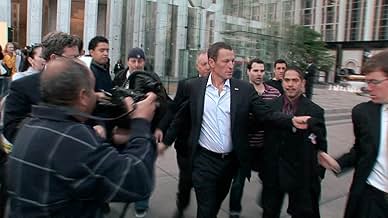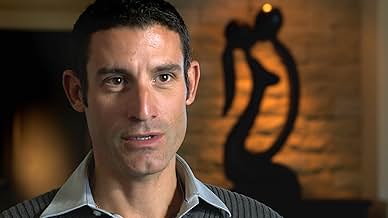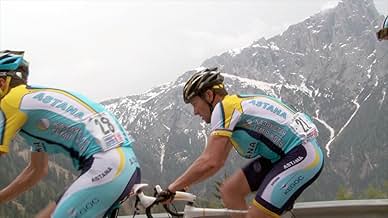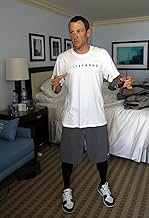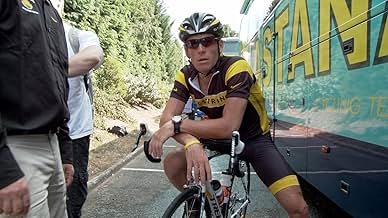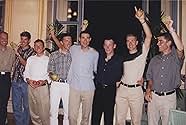VALUTAZIONE IMDb
7,2/10
8187
LA TUA VALUTAZIONE
Aggiungi una trama nella tua linguaA documentary chronicling sports legend Lance Armstrong's improbable rise and ultimate fall from grace.A documentary chronicling sports legend Lance Armstrong's improbable rise and ultimate fall from grace.A documentary chronicling sports legend Lance Armstrong's improbable rise and ultimate fall from grace.
- Regia
- Sceneggiatura
- Star
- Nominato ai 1 BAFTA Award
- 2 vittorie e 8 candidature totali
Michael Bloomberg
- Self - NYC Mayor
- (filmato d'archivio)
Bill Clinton Jr.
- Self - Former US President
- (filmato d'archivio)
Anderson Cooper
- Self - Interviewer
- (filmato d'archivio)
Sheryl Crow
- Self - Lance's Girlfriend
- (filmato d'archivio)
Tyler Hamilton
- Self - Teammate
- (filmato d'archivio)
Recensioni in evidenza
The Armstrong Lie is a documentary that takes a deep look at one of the most horrendous best kept lies of the sports history, the rise and fall of Lance Armstrong after being disgracefully accused for doping. He was once known as the greatest cyclist the world has ever seeing who won 7 Tour De France titles from 1999-2005 after battling and recovering from cancer.
After winning 7 titles and being away for 4 years in retirement Armstrong makes a surprise come back in 2009 with hopes of winning another title and raising funds for cancer patients. The director of this documentary Alex Gibney was hired to make a documentary of the comeback of Armstrong and he has being covering Armstrong's sports history for quite some time. But as the doping scandal came to light the original project was never finished. But in 2013 Gibney decided that he needs a proper ending to his documentary and re-opened it after Armstrong makes a confession on Oprah Winfrey show.
This documentary is quite easy and interesting to follow. For someone with even a mild knowledge about professional cycling and Armstrong it can be digested without much effort. While having a deep look at Armstrong's sporting career and the doping dilemma the documentary effectively provides important background information about the sport itself that fuels the main plot. And it manages to tell the story from several perspectives than being biased in to one point of view, the intention being the viewer to have their own conclusion of what had really happened. There ample amount of historical footage of practice runs, races, press conferences, court trials and other video that builds a strong case relating to each other. Obviously for being someone like Armstrong most of his well-known part of his entire life is on film somewhere. The challenge which the director goes through is to filter the most relevant and create a flow that doesn't over hype or dull to the viewer. In my opinion the job was well done.
The Armstrong Lie is a powerful piece of documentary film making. And it would give you new perspective of what really went on with Lance Armstrong. Maybe you have followed his case eagerly while it was hot but now since things have gone a bit cold a relook would be ideal. Just as Armstrong phrase many times it felt OK at the time.
After winning 7 titles and being away for 4 years in retirement Armstrong makes a surprise come back in 2009 with hopes of winning another title and raising funds for cancer patients. The director of this documentary Alex Gibney was hired to make a documentary of the comeback of Armstrong and he has being covering Armstrong's sports history for quite some time. But as the doping scandal came to light the original project was never finished. But in 2013 Gibney decided that he needs a proper ending to his documentary and re-opened it after Armstrong makes a confession on Oprah Winfrey show.
This documentary is quite easy and interesting to follow. For someone with even a mild knowledge about professional cycling and Armstrong it can be digested without much effort. While having a deep look at Armstrong's sporting career and the doping dilemma the documentary effectively provides important background information about the sport itself that fuels the main plot. And it manages to tell the story from several perspectives than being biased in to one point of view, the intention being the viewer to have their own conclusion of what had really happened. There ample amount of historical footage of practice runs, races, press conferences, court trials and other video that builds a strong case relating to each other. Obviously for being someone like Armstrong most of his well-known part of his entire life is on film somewhere. The challenge which the director goes through is to filter the most relevant and create a flow that doesn't over hype or dull to the viewer. In my opinion the job was well done.
The Armstrong Lie is a powerful piece of documentary film making. And it would give you new perspective of what really went on with Lance Armstrong. Maybe you have followed his case eagerly while it was hot but now since things have gone a bit cold a relook would be ideal. Just as Armstrong phrase many times it felt OK at the time.
When everyone cheats, it becomes a different contest. The powerful friends, money (125 million plus), risk and pain tolerance, influential scientists, compelling story, performance enhancing drugs, viciousness, ambition to win at all costs, willingness to bully others, . . . Armstrong has all this and more. The documentary is a powerful and gripping indictment not just of Armstrong and cycling, but of sports and humanity in general. Armstrong's doping is bad, but his abuse of power is worse. The film shows how willing people are to be fooled, or to trample on others. Despite its two-hour length, the film held my interest throughout. There are so many parallels in a short story by Nathaniel Hawthorne, wherein he writes, "There is something truer and more real, than what we can see with the eyes, and touch with the finger." So too with Armstrong, cycling, sports, and all of us. This brilliant documentary helps bring such truths to the surface.
In 2009 Alex Gibney set out to make a documentary about Lance Armstrong's return to the racing circuit. Armstrong had won the Tour De France seven times and had beaten cancer. He was a winner in every respect until finally the allegations that had dogged him for years, that he had used performance enhancing drugs, caught up with him and on Oprah Winfrey's television show he finally admitted to cheating and Gibney's film, originally designed to celebrate Armstrong, became "The Armstrong Lie", as Gibney searched for reasons for his behaviour. Could it be that he simply had to become a winner whatever the cost? Gibney felt that Armstrong owed him since Armstrong had lied to him in 2009 when Gibney set out to celebrate Armstrong's career, so he continued with his film forcing Armstrong to confront his duplicitous past, (though even now Armstrong is holding some things back), and the result is this extraordinary film. "The Armstrong Lie" is the kind of film that pays tribute, not just to its subject, (though, perhaps, tribute isn't quite the right word in this case), but to the genre itself, (it's as exciting as any fictional thriller). Gibney already has an Oscar under his belt; in a just world he would have added another for this brilliant movie.
This movie - and the situation it chronicles - forces us to consider
to what extent we can expect an even playing field - literally - when we watch sports. The athletes say, "Every one else was doing it."
When fans watch NASCAR races, I hope they understand that it's a team sport. The people who built the car, the people who maintain it, the guys who change the tires, the spotters and others contribute as much or more to the win as does the driver. However, when we see an individual athlete - biker, runner, skier, etc. - compete, do we see that the "best man" wins or the performer with the best doctor, the best chemist and research department and the cleverest lawyer to get around the system, as one of the interviewees in this movie suggests.
Should we accept that performance enhancements are now a part of sports, athletes and their supporters will continue to find ways to counter efforts to limit them and accept that? The destructive qualities of steroids - including their potential for violent behavior and the process Armstrong admitted using raise doubt. The drug Amstrong took and the use of blood transfusions to short-cut the body's process for communicating and responding to muscle fatigue surely must be physically destructive. However, I have long had questions about the long-term effects of professional football tackles, questions now being answered, at least in terms of head injuries. Players and fans continue to accept this.
This movie may be more interesting to people who are not cycling fans but is a good exploration of a range of observers and participants.
to what extent we can expect an even playing field - literally - when we watch sports. The athletes say, "Every one else was doing it."
When fans watch NASCAR races, I hope they understand that it's a team sport. The people who built the car, the people who maintain it, the guys who change the tires, the spotters and others contribute as much or more to the win as does the driver. However, when we see an individual athlete - biker, runner, skier, etc. - compete, do we see that the "best man" wins or the performer with the best doctor, the best chemist and research department and the cleverest lawyer to get around the system, as one of the interviewees in this movie suggests.
Should we accept that performance enhancements are now a part of sports, athletes and their supporters will continue to find ways to counter efforts to limit them and accept that? The destructive qualities of steroids - including their potential for violent behavior and the process Armstrong admitted using raise doubt. The drug Amstrong took and the use of blood transfusions to short-cut the body's process for communicating and responding to muscle fatigue surely must be physically destructive. However, I have long had questions about the long-term effects of professional football tackles, questions now being answered, at least in terms of head injuries. Players and fans continue to accept this.
This movie may be more interesting to people who are not cycling fans but is a good exploration of a range of observers and participants.
Review: After watching the Program recently, I thought I should watch the real story about Lance Armstrong, because I couldn't believe that a man could be so vindictive and manipulating to so many people, and now that I've watched this in depth documentary, he was worse than I first expected. The fact that he nearly got away with taking drugs during his 7 championship races, sickens my stomach and I personally think that he should be stripped of all of his personal earnings, which he has made from his deception and bare-faced lies. He ruined so many people's life's, including his fellow racers and he damaged there reputations by claiming that they were lying about his drug taking. Because of the power that he gained during his cycling career, he had the backing of some very important people, who helped him through his successful career but when the truth came out about his filthy habits, he tarnished there reputations and made loads of money after coming clean. His excuses for taking the enhanced performing drugs, were that it was the norm at that time and there wasn't any tests that could track the drugs, and the only reason why he got caught, even though there was loads of investigations, was because he returned to cycling after retiring with his 7 consistent wins. Anyway, I found the documentary very entertaining and well put together by the director and the various interviews with the people who surrounded Lance Armstrong at that time, proved that he really wasn't a nice person. The sad thing is, he actually could have won a few of the championships without the drugs! Enjoyable!
Round-Up: This documentary was directed by Alex Gibney, 62, whose known for his documentaries and his in depth look into debatable matters. He won an Oscar for Taxi To The Dark Side in 2008 and he was nominated for an Oscar in 2006 for Efron: The Smartest Guys In The Room. He's directed documentaries about WikiLeaks, James Brown, musical artist Fela Kuti, Steve Jobs, Frank Sinatra and various political matters. Judging by this film, he's not one to hold back information and he does get down to the nitty gritty when it comes to delicate situations, so I'm looking forward to watching some more of his projects.
Budget: N/A Worldwide Gross: $500,000
I recommend this movie to people who are into their sport/documentaries about Lance Armstrong's rise and fall from grace. 7/10
Round-Up: This documentary was directed by Alex Gibney, 62, whose known for his documentaries and his in depth look into debatable matters. He won an Oscar for Taxi To The Dark Side in 2008 and he was nominated for an Oscar in 2006 for Efron: The Smartest Guys In The Room. He's directed documentaries about WikiLeaks, James Brown, musical artist Fela Kuti, Steve Jobs, Frank Sinatra and various political matters. Judging by this film, he's not one to hold back information and he does get down to the nitty gritty when it comes to delicate situations, so I'm looking forward to watching some more of his projects.
Budget: N/A Worldwide Gross: $500,000
I recommend this movie to people who are into their sport/documentaries about Lance Armstrong's rise and fall from grace. 7/10
Lo sapevi?
- QuizFilmmaker Alex Gibney followed Lance Armstrong for four years with the intent of chronicling his return to cycling after retirement as Armstrong tried to win his eighth Tour de France. Unexpectedly, Gibney was also there when Armstrong admitted to doping, which resulted in the film being retitled from "The Road Back" to "The Armstrong Lie."
- Citazioni
Lance Armstrong: I viewed my battle with cancer as an athletic competition. But in that, you either win or you lose. When you lose, or if you lose, you die. So I took that perspective, which is a little dark, and I put it into everything I've done since then. I like to win. But more than anything, I can't stand the idea of losing, because, to me, that equals death.
- ConnessioniFeatured in At the Movies: Venice Film Festival 2013 (2013)
I più visti
Accedi per valutare e creare un elenco di titoli salvati per ottenere consigli personalizzati
- How long is The Armstrong Lie?Powered by Alexa
Dettagli
- Data di uscita
- Paese di origine
- Sito ufficiale
- Lingua
- Celebre anche come
- Lance Armstrong: The Road Back
- Aziende produttrici
- Vedi altri crediti dell’azienda su IMDbPro
Botteghino
- Lordo Stati Uniti e Canada
- 383.294 USD
- Fine settimana di apertura Stati Uniti e Canada
- 28.992 USD
- 10 nov 2013
- Lordo in tutto il mondo
- 594.394 USD
- Tempo di esecuzione2 ore 4 minuti
- Colore
- Mix di suoni
Contribuisci a questa pagina
Suggerisci una modifica o aggiungi i contenuti mancanti

Divario superiore
By what name was The Armstrong Lie (2013) officially released in India in English?
Rispondi






